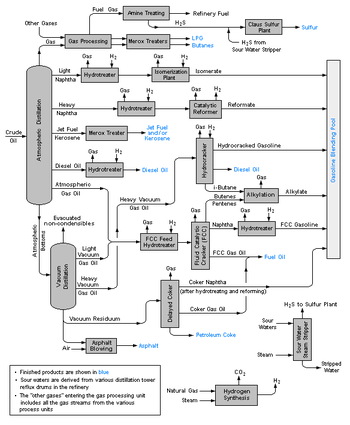The safety case regulatory regime is touted as a “tripartite system consisting of active and equal participation from the regulator, workforce, and industry.” Indeed, a potentially, more socially beneficial regime would be a quadripartite system that includes the neighbors of the regulated facilities. The neighbors are often aware of problems that workers don’t or won’t address, the neighbors are the only potential participants who are continually subject to the the vagaries of the refineries, and the neighbors have an important stake in the refineries’ safe operation.
The neighbors of oil refineries in Southern California are subject to a psychological linear no-threshold scenario. While there is hormesis insofar as such facilities employ some of their neighbors, there is also the cumulative stress of millions of people living near facilities that are constantly subject to very low probabilities of catastrophes. In part, this is due to management and safety practices that have been conditioned by decades of relatively rigid and irreversible land use laws and zoning (including the absence of sunset provisions (i.e., “grandfathering”) on exempted standards and regulations) and endemic regulatory antipathy to strict rules with meaningful penalties for noncompliance.
In the case of grandfathering, the original rationale was that significant, sudden regulatory change hurts existing facilities and discourages future investment. Arguments centering on “fairness” and “economic feasibility” (e.g., it is less expensive to implement pollution controls at the time of new construction rather than as a retrofit) were developed to favor the owners of infrastructure. In retrospect, some obvious problems emerged. By creating a regulatory environment favoring existing facilities, grandfathering has perpetuated perverse incentives to keep aging facilities open. Protecting such assets has meant downplaying public safety, deferring maintenance and upgrades, and operating less efficiently. Instead, when an area’s zoning changes or when safety and health regulations are updated, the implementation of grandfathering, at least with respect to public safety and environmental compliance issues, should either be eliminated or strictly delimited in scope and time. As such, improved land use regulations are part of the pathway to safer refineries.
And, wherein the proposed safety case regulatory regime is a vast improvement over the status quo, an enhanced regulatory approach might also include the implementation of weak and strong precautionary principle regimes with respect to two (new) classes of refinery:
1. A weak precautionary principle regime (similar to the Rio Declaration principles) would apply to new refineries or existing refineries that had undergone a risk analysis, cost-benefit analysis, and the implementation and approval of these analyses’ recommendations. These analyses would be conducted by regulators (or their agents) and funded by the owners.
2. A strong precautionary principle regime (similar to the Earth Charter principles) would apply to existing refineries.
Concurrent with the implementation of these regimes, new indemnification and liability provisions would be implemented. Indemnification would be unlimited and, in certain instances (e.g., gross negligence or willful conduct), inure personally to management, officers, and board members. Acceptable liability insurance limits would be determined during the risk analysis and cost-benefit analysis process.
Such changes would help describe and delimit the intent and scope of what “ALARP” means in this new context, would assist in transitioning from PSM to safety case regulation, and would set the stage for fuller implementation of an updated, comprehensive regulatory regime partnership between the state and federal governments which eventually covers all aspects of the oil and gas industry.
The report can be downloaded at the CSB website.
The comments can be download at this link.
Related articles



 Feds want tougher refinery oversight in California
Feds want tougher refinery oversight in California Federal report calls for sweeping reforms in aftermath of Calif. refinery fire
Federal report calls for sweeping reforms in aftermath of Calif. refinery fire Stricter industrial-safety rules sought
Stricter industrial-safety rules sought
 USW Welcomes CSB Draft Report on Chevron Richmond Refinery Fire
USW Welcomes CSB Draft Report on Chevron Richmond Refinery Fire